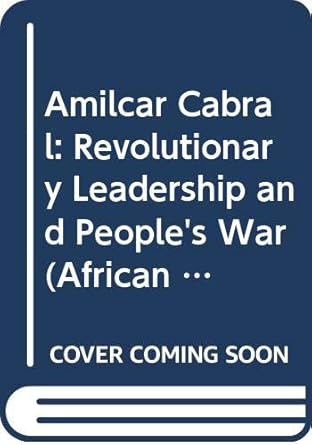
Download the free Kindle app and start reading Kindle books instantly on your smartphone, tablet or computer – no Kindle device required.
Read instantly on your browser with Kindle for Web.
Using your mobile phone camera - scan the code below and download the Kindle app.

Amilcar Cabral: Revolutionary Leadership and People's War (African Studies, Series Number 37) Hardcover – 1 Jan. 1983
- LanguageEnglish
- PublisherCambridge [Cambridgeshire] ; New York : Cambridge University Press
- Publication date1 Jan. 1983
- ISBN-100521249449
- ISBN-13978-0521249447
Product details
- Publisher : Cambridge [Cambridgeshire] ; New York : Cambridge University Press; First Edition (1 Jan. 1983)
- Language : English
- ISBN-10 : 0521249449
- ISBN-13 : 978-0521249447
- Customer reviews:
About the author

Discover more of the author’s books, see similar authors, read book recommendations and more.
Customer reviews
- 5 star4 star3 star2 star1 star5 star68%32%0%0%0%68%
- 5 star4 star3 star2 star1 star4 star68%32%0%0%0%32%
- 5 star4 star3 star2 star1 star3 star68%32%0%0%0%0%
- 5 star4 star3 star2 star1 star2 star68%32%0%0%0%0%
- 5 star4 star3 star2 star1 star1 star68%32%0%0%0%0%
Customer Reviews, including Product Star Ratings, help customers to learn more about the product and decide whether it is the right product for them.
To calculate the overall star rating and percentage breakdown by star, we don’t use a simple average. Instead, our system considers things like how recent a review is and if the reviewer bought the item on Amazon. It also analyses reviews to verify trustworthiness.
Learn more how customers reviews work on Amazon-
Top reviews
Top reviews from United Kingdom
There was a problem filtering reviews right now. Please try again later.
It tells, in astonishing detail and good-research, the life and times of a now very much forgotten African leader.
The book brilliantly discusses:
1. Amilcar Cabral as an outstanding academic in agriculture and in political thought.
2. Amilcar Cabral as a highly admirable person whose charisma, insistence on fairness, dialogue and forgiveness were not only admirable, but actually cost him his life.
3. Amilcar Cabral as a nationalist visionary whose political party, later guerrilla movement, was the only successful military take over of an African colonial territory: in other words, he didn't negotiate anything with the Portuguese (given their reluctance to do so) and so won the war of liberation and unilaterally declared independence.
4. Amilcar Cabral the clever diplomat: his chess-player intelligence and foresight made him respected on both sides of the Cold War spectrum, at the UN and even amongs the clandestine opposition in Portugal. Despite his war agains portuguese soldiers, most of whom forcefully conscripted, much of the Portuguese society felt sympathy towards his cause, as he insisted regularly that the struggle for freedom in Portuguese Guinea was one and the same as the aspiration for freedom in dictatorship Portugal.
However, one unfortunate element of the book is that, given the overwhelming positive impression we get from Amilcar Cabral, almost nothing is said about his personal life, aspects what although not decisive in his political legacy, would have nonetheless made for interesting reading. For instance, his divorce and second marriage is not even mentioned other than a few lines. The author Patrick Chabal can yet bring out a new edition of this book and delight us with more info!

